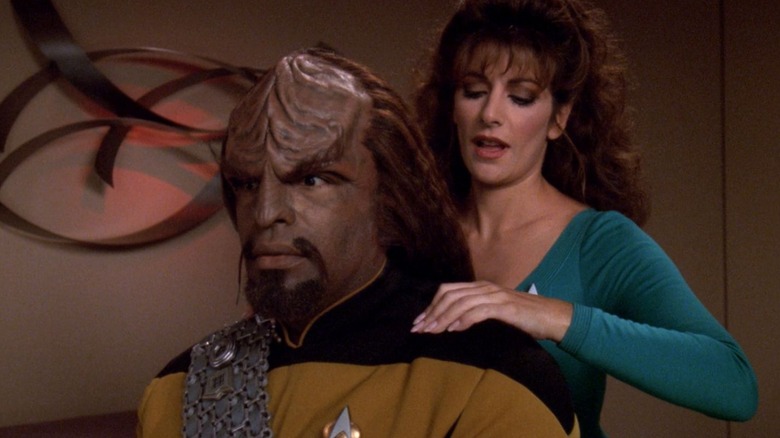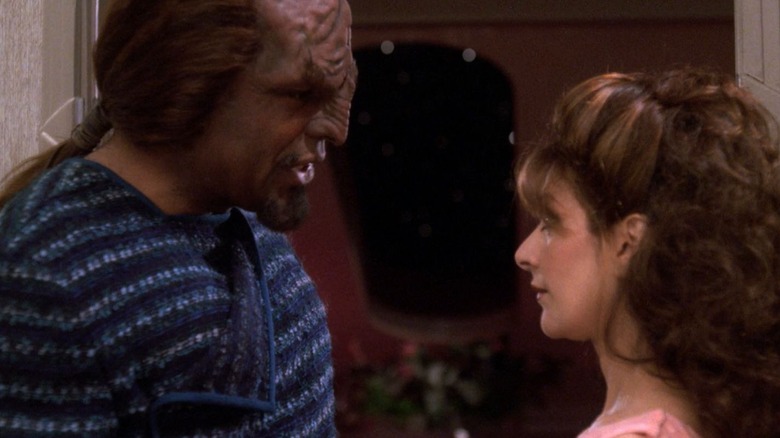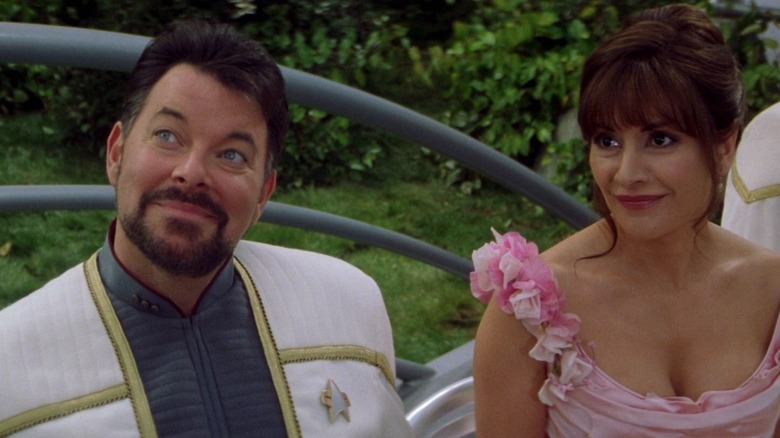Star Trek's Marina Sirtis Thinks Troi And Worf's Relationship Was Bad For Michael Dorn
We may receive a commission on purchases made from links.
In the "Star Trek: The Next Generation" episode "Parallels" (November 29, 1993), Worf (Michael Dorn) passes through a negative space wedgie that causes him to start leaping between parallel quantum universes without warning. He'll feel a little lightheaded, close his eyes, open them, and find that small, subtle things have changed. Data's eyes have changed color. His first place trophy turns into an eighth place trophy. As the episode elapses, the parallel universes get further apart, and the changes between them becomes more dramatic. Dr. Crusher (Gates McFadden) is dead. Captain Picard (Patrick Stewart) is no longer in command of the Enterprise.
One of the more astonishing personal changes for Worf is that, in one universe, he is married to Counselor Troi (Marina Sirtis). This was a shocking twist, as Worf and Troi never had any kind of romantic regard, nor did they seem to be a good romantic match. Worf is angry, aloof, tough, and values honor and other warrior virtues. Troi, being the ship's counselor, is calm and emotionally collected. She is a matronly figure who can sense the emotions of others. Worf and Troi wouldn't have much to talk about.
"Parallels," however, implied that Worf and Troi would begin dating in earnest thereafter, and had a few romantic scenes in the back half of NextGen's seventh season. Few people liked this development, and felt that Troi and Worf were an awful couple. Luckily, their romance was totally forgotten by the time "Star Trek: Generations" came out in 1994.
Even Marina Sirtis hated the Troi/Worf romance, something she talked about in a recent video interview. She felt that the romance with Worf was a disservice to Worf, making the character less Klingon and too human.
The Troi/Worf romance made Worf less Klingon
Throughout "Next Generation," Worf has repeatedly said that he could only ever find romance with a Klingon woman, and did a few times. He had a child with the half-Klingon, half-human Ambassador K'Ehleyr (Sisue Plakson), and a brief romantic dalliance with a half-Romulan, half-Klingon woman named Gi'ral (Cristine Rose). It's also been established that Klingons are violent lovers, and that non-Klingons are too "fragile" for Klingon mating rituals.
Sirtis knew all of this, and felt that softening Worf by making him a gentle, tender, romantic fellow robbed him of his Klingon-ness. In her words:
"I didn't like the fact that he totally became un-Klingon-like when he was with Troi. He kind of became a p***y. [...] I thought it was detrimental to his character. Not that I should be worried about Worf ... but I liked better the relationship he had with Dax on 'DS9.' Because they match. It was a good, strong ... He was a Klingon, she was a Trill. Whatever things they had going on in their cultures, they brought to the relationsjip. It was just the whole dichotomy of having a beauty with a Klingon."
After "Generations," Worf became a regular character on "Star Trek: Deep Space Nine," beginning in its fourth season. On that series, Lieutenant Jadzia Dax (Terry Farrell) was a young woman with a centuries-old symbiote surgically implanted in her abdomen, a symbiote turned Dax into a composite being made up of the worm's many lifetimes of experience. Dax, in previous lives, tooled around with Klingons, and was familiar with Klingon philosophies and fighting techniques. It made more logical and romantic sense that Dax and Worf would be attracted to one another. If you're going to write a "beauty and the Klingon" story, then Dax and Worf was the way to go.
Troi and Riker were the better Star Trek couple anyway
In the invaluable oral history book "The Fifty-Year Mission: The Next 25 Years: From The Next Generation to J.J. Abrams," edited by Mark A. Altman and Edward Gross, Sirtis went on record again with how disappointed she was with the Worf/Troi romance, and was relieved that the franchise returned to her character's romance with Commander Riker (Jonathan Frakes). In the pilot episode of "Next Generation," it was established that Troi and Riker used to date, even becoming one another's Imzadi, a Betazoid term for a special first-love-type relationship. The idea was that drama would stem from the pair having to be professional with one another.
The romance between Riker and Troi popped up from time to time, but wasn't really re-instigated until the events of the movie "Star Trek: Insurrection" (1998). The pair married in "Star Trek: Nemesis" (2002). On that matter, Sirtis said:
"I'm glad ['Nemesis'] began with the wedding of Troi and Riker, thanking God that it wasn't Troi and Worf [...] I would have killed myself. I never liked that relationship. We pretend that it never happened. Michael Dorn was subtexting his ass off, but a lot of it ended up on the cutting room floor."
Dorn, meanwhile, said he was fine with the Troi/Worf romance. He's the only one, it seems, who doesn't take issue with it. He said in an interview with StarTrek.com that the romance was a good opposites-attract scenario. "Troi was so not like Worf," he said positively. To each their own, I suppose.


